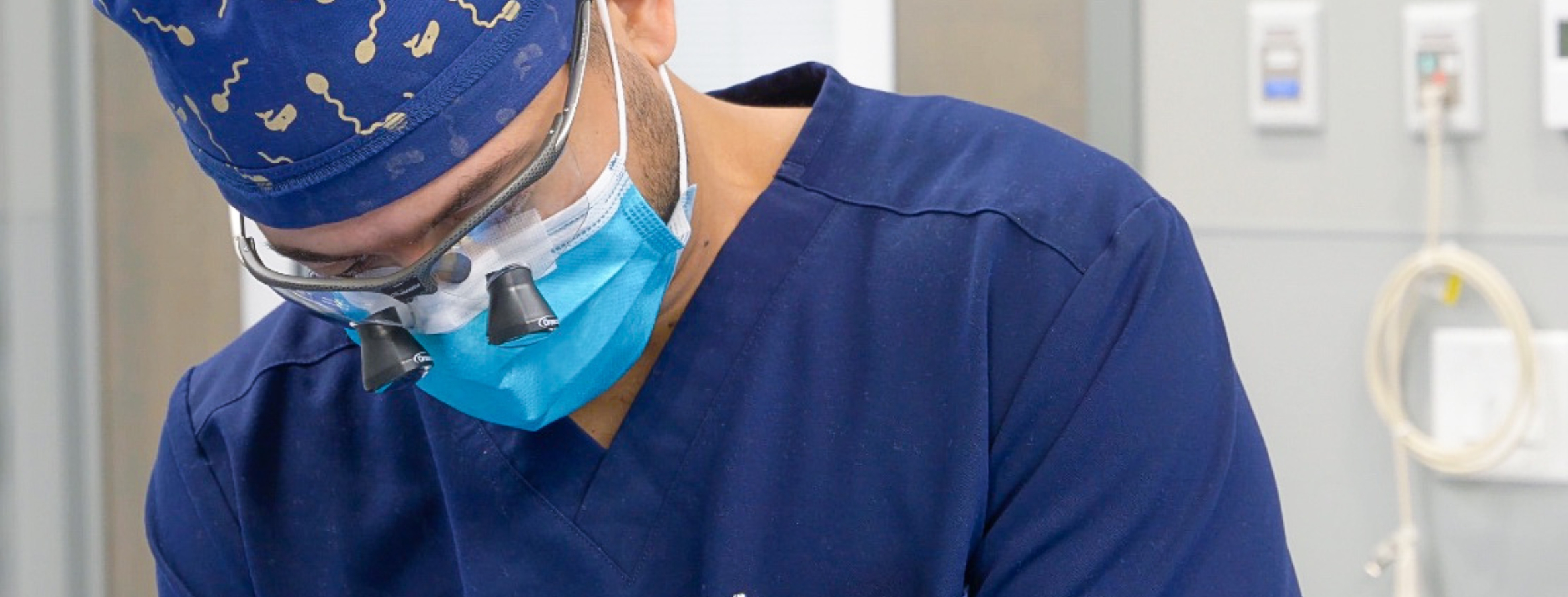
Male Infertility
Causes, Evaluation & Treatment Options

Causes, Evaluation & Treatment Options
Infertility is a common, emotionally taxing, and complex problem affecting approximately 15 percent of couples attempting to conceive. In up to 50 percent of couples having difficulty getting pregnant, the problem is at least in part related to male reproductive issues. In 30 percent of couples, the problem is solely male. As such, we recommend that the man be evaluated early in the infertility workup because treatment of male infertility allows the couple a chance of conceiving naturally.
Urologists are experts in the male urological system, which includes male reproductive organs. Our urologists have the experience and expertise necessary to evaluate the problem, understand underlying conditions that may be causing it, and have the specialized training to manage the treatment of male infertility. Our ultimate goal is natural conception, which may be possible with treatment.
The causes of male infertility are numerous; some are simple and easily corrected, and others are more complex and genetic. These causes can be divided into two groups: production problems and obstruction.
Infertility is a delicate issue. We understand and provide a compassionate environment to evaluate male infertility.
The process begins with:
From a sample of semen, our urologist will be able to assess factors – volume, count, concentration, movement, and structure of spermatozoa – that help or hinder conception.
Sperm extraction and aspiration is a surgical procedure used to retrieve sperm from the testicles or epididymis when it’s not available in the ejaculate.
Even if the semen analysis shows low sperm numbers (oligospermia) or no sperm (azoospermia), this does not necessarily mean absolute infertility. Low values in any of the above categories may indicate a problem with sperm development or delivery that simply requires further evaluation.
For instance, our urologist may order a trans-rectal ultrasound, an imaging test that places a probe into the rectum to beam high-frequency sound waves to nearby ejaculatory ducts. This test can help our urologist determine whether these structures are poorly developed or obstructed with cysts, calcifications, or other blockages.
A testicular biopsy comes into play when a semen analysis shows a very low number of sperm or no sperm. This test is performed in an operating room under general or regional anesthesia through a small cut in the scrotum. It may also be done in a clinic using a needle inserted through the skin over the testicle that has been anesthetized. In either case, a small piece of tissue is removed from each testicle for microscopic evaluation. The biopsy serves two purposes: to determine the cause of infertility and, if necessary, to retrieve sperm for use in assisted reproduction.
In addition to a semen analysis, our urologist may order a hormonal profile to determine the sperm-producing ability of your testicles and rule out serious conditions. Follicle-stimulating hormone (FSH) is a pituitary hormone that stimulates the testicles to produce sperm.
Selecting the proper fertility treatment is among the most important decisions a couple makes. The decision should be deliberate based on medical facts and a couple’s preferences. Many problems are treatable through microsurgery and hormonal therapy, providing a couple the opportunity to try to conceive naturally. If these techniques fail, our highly skilled urologists can offer couples a variety of other advanced, assisted reproductive techniques to promote conception. For instance, unless sperm is absent, our urologists directly extract sperm from the testes and use them for assisted reproductive techniques such as IVF/ICSI (in vitro fertilization).
A variety of diseases – from kidney disease to testicular cancer – can result in male infertility. For instance, systemic conditions and metabolic disorders, along with ordinary fevers and infections, can impair the development of sperm. In addition, sexually transmitted diseases can lead to obstruction and scarring of the reproductive tract while genetic conditions, such as cystic fibrosis, may result in lack of sperm due to missing vas deferens or seminal vesicles. Since any number of illnesses can be a factor, it is essential that both you and your partner know and share your family and personal medical histories with your doctor.
Yes. Research has shown that regular smoking impacts the sperm in a variety of ways. It decreases the size and movement of these cells and damages their DNA content. Smoking also can impact the seminal fluid, ejaculated with the sperm.
Yes. Steroids taken either by mouth or injection can shut down the production of hormones needed for sperm production.
Not necessarily. For the majority of couples seeking fertility treatment, the risk of conceiving a child with a birth defect is the same as the general population. Though, some disorders (especially genetic disorders) that cause infertility may also cause an increased risk of conceiving a child with birth defects. It is for this reason that couples need thorough evaluation and counseling prior to proceeding with some forms of assisted reproductive techniques.
Neither you nor your partner should be blamed for any problems you have with fertility. The American Society of Reproductive Medicine (ASRM) estimates that roughly one-third of infertility cases can be attributed to male factors, with another one-third due to women. In the remaining one-third of infertile couples, infertility is caused by either a combination of factors, or, in 20 percent of cases, is still unexplained. (In men, few or no sperm is the biggest problem; in women, the common problems are ovulation disorders and blocked tubes.) But today, physicians have the technology and surgical tools to address many of those problems.